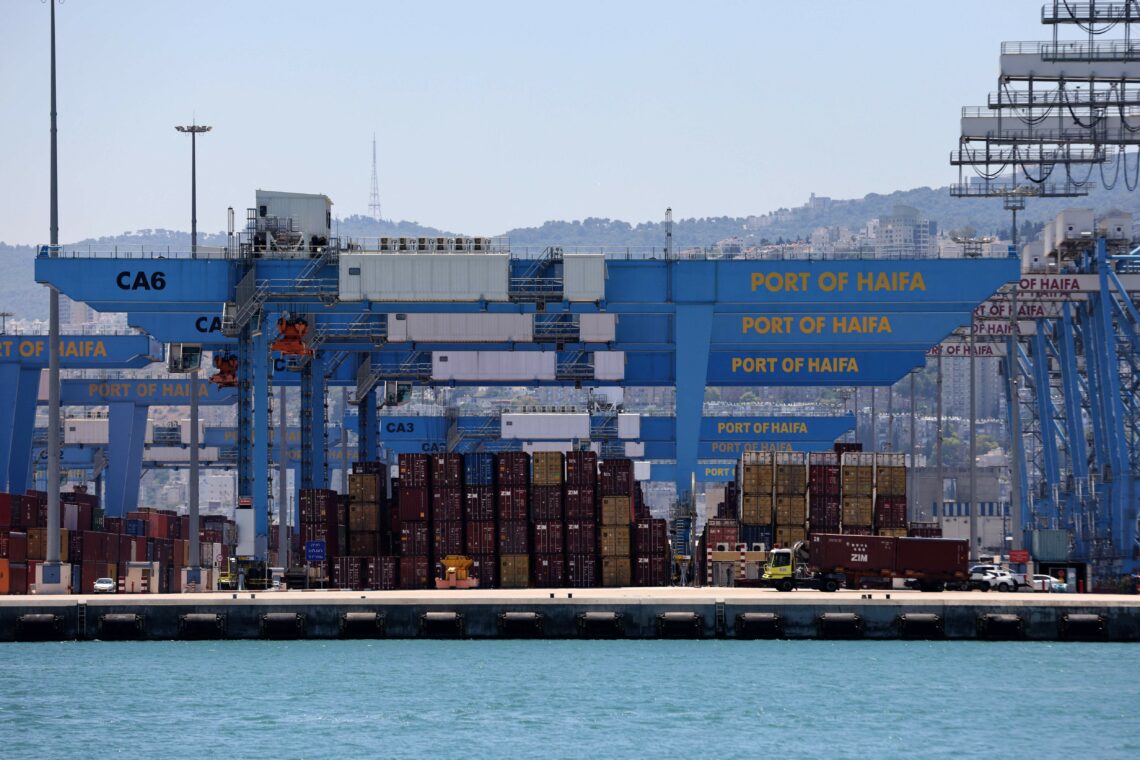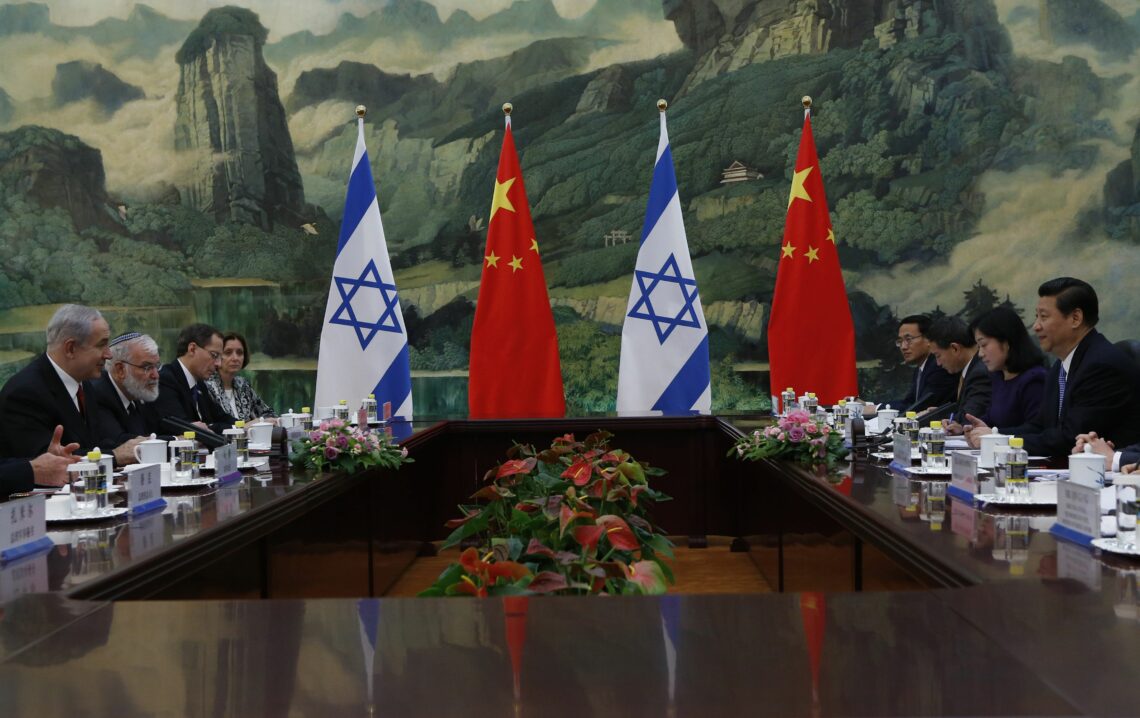Israel’s tightrope act between China and the U.S.
Increasing tensions between China and the United States have made it more difficult for Israel to maintain hard-won trade and economic ties with Beijing without endangering the special relationship with its most faithful ally. Israel must move cautiously.

In a nutshell
- Chinese investments in Israel are expanding in scope and scale
- American scrutiny of Israel-China ties is increasing
- Israel must carefully weigh new initiatives
For the past several years China and the United States have been on a collision course, making it increasingly difficult for Israel to maintain relations and hard-won economic ties with Beijing without endangering the special relationship with its most faithful ally. Washington has been clear it prefers an end to aspects of Israel-China cooperation that threaten its security. While the Israeli government has reluctantly turned down a number of promising projects and restricted the scope of its partnership with China, the issue is far from solved.
Israel had recognized the People’s Republic of China in 1950, despite American opposition at the time, perhaps because China had welcomed Jewish refugees before and during World War II. But diplomatic relations were not established at the time. Following the 1955 Bandung Conference, China (for geostrategic reasons) aligned itself with developing countries and Arab states. It later backed Arab armed conflicts against Israel and recognized the Palestine Liberation Organization (PLO)when it was established in 1964. The PLO opened an office in Beijing and set up training camps in the country, with the help of Chinese experts and weaponry.
During the 1967 Six-Day War and the 1973 Yom Kippur War, there were demonstrations in support of the Arab states in China, while Chinese representatives voted to condemn Israel in United Nations forums. The growing friendship between Israel and the U.S. only exacerbated Chinese hostility, as Israeli overtures to Beijing fell on deaf ears.
Growing ties
Nevertheless, the 1980s saw secret security ties develop between the two countries: Israel providing weapons and technology, while visits to China by Israeli scientists sowed the seeds of the relations that would later deepen. Mao Zedong’s successor Deng Xiaoping established diplomatic relations with the U.S. in 1979, and initiated a policy of cooperation with the West – including Israel.
Fast-growing economic ties led to the establishment of formal relations in 1992 and a wide range of trade and economic representations. Then came a string of agreements in the fields of trade, export promotion, tourism and deepening contacts between governments and major firms. In 2006, trade exchanges amounted to $3.3 billion, with Israel exporting $958.4 million and China $2.43 billion; in 2019 these figures were $4.3 billion and $10.2 billion, respectively. There are now cooperation agreements in science, technology, transport, food, and agriculture, as well as considerable Chinese investments in Israel.
Israel must move cautiously, going ahead with projects already underway but carefully weighing new initiatives.
Attracted by Israel’s innovative spirit and not seeing such a small country as a security threat, China has become a major economic partner for the Jewish state, right behind the European Union and the United States. Former Israeli Prime Minister Benjamin Netanyahu – embarking on a policy of privatization of infrastructure such as ports and transportation – visited China in 2013 and 2017 to convince Chinese companies to invest there. He also backed China’s ambitious Belt and Road initiative. During the 2017 visit, to celebrate 25 years of diplomatic relations, 25 cooperation agreements were signed for a total of $2 billion.
Leading projects involving Chinese companies have included a wide range: the Carmel Tunnels in Haifa and the railway tunnel under the Gilon mountain in Northern Israel; a southern port in Ashdod, and the renovation of Pier 21 there; participation in the construction of the Tel Aviv light rail system; controlling interests in the crop protection company Adama Agricultural Solutions and in Tnuva, Israel’s milk and dairy giant; the acquisition of the well-known Ahava Dead Sea cosmetics; and the new deep-sea Bay Port, north of Haifa, to be operated by the Shanghai International Port Group (SIPG). There are no precise statistics of the number of Chinese workers in Israel, but estimates run in the tens of thousands.
Chinese giants such as Alibaba and Huawei have invested in 463 Israeli companies between 2002 and 2020, mainly in advanced technology. All Israeli universities have partnerships with Chinese universities. For one, China’s University of International Business and Economics is scheduled to open a branch in Petah Tikva in October to teach Israelis how to do business with China; its director will be Matan Vilnai, former Israeli ambassador to China.
Security threat
While these positive developments were taking shape, the U.S. increasingly began to view China as a strategic, economic and technological rival. Among other factors, threats by Beijing to invade Taiwan ratcheted up the tensions. Thus in 1999, Washington opposed the sale to China of three Phalcon spy planes upgraded by Israel Air Industries with an Airborne Warning and Control System (AWACS) – fearing they would pose a danger to Taiwan by letting Chinese experts examine the new technology. Faced with the threat of a $250 million cut in American assistance, Israel canceled the deal, which had been in its final phase. It temporarily impacted bilateral relations, but after a full apology and the payment of the $350 million cancellation fee, Israel and China were back on course.
The depth of Chinese involvement in Israeli infrastructure is causing also great uneasiness in security circles. On the eve of the visit of the Chinese vice president in Israel in October 2018, it was leaked to The Economist that the trip could be dangerous coming as relations between Beijing and Tehran were warming. It was also stressed that though all sales of weapons to China had stopped in 2005 (due to American pressure), Chinese experts were finding ways to obtain dual purpose technologies – those such as artificial intelligence and cybersecurity tools, intended for civilian use but which could be adapted for intelligence and observation. Former Mossad head Efraim Halevy went as far as to say that however important exports are to China, Israel should find suitable ways to prevent the sale of prime economic assets and state-of-the-art technology.

U.S. President Barack Obama was the first to realize that a political vacuum was in the making in the Pacific and Indian Oceans, and that China was trying to fill it. To counter that effort, he made Asia his main strategic preoccupation, reducing American commitments in Europe and in the Middle East. He refrained from intervening in Syria and devoted his efforts to reaching a nuclear deal with Iran, without taking into account its dangerous shortcomings. His successor, President Donald Trump, intensified efforts to contain China, and suddenly Israel was in the crosshairs. Washington had been alerted by the tender about to be awarded to Shanghai International Port Group to operate the new Haifa Bay Port (an extension of the Haifa Port); as well as the deal about to be awarded to Chinese conglomerate CK Hutchison for the construction of Sorek 2, one of the world’s biggest desalination plants, not far from the Sorek nuclear research plant.
In his surprise visit to Jerusalem in May 2020, then-U.S. Secretary of State Mike Pompeo warned Israel to move cautiously, not to endanger its cooperation with its strongest ally. In an interview, he declared: “We don’t want the Chinese Communist Party to have access to Israeli infrastructure and to Israeli communication systems – all of the things that put Israeli citizens at risk.” Sources in Washington added that should China be involved in operating the port of Haifa, U.S. Navy’s Sixth Fleet vessels that regularly stop there would no longer do so.
Crossfire
Israel took the warning seriously. The $1.5 billion tender for the building of Sorek 2 was awarded to an Israeli company, though its offer was probably higher than the Chinese one. Negotiations with a Chinese company about establishing a 5G communication network were halted. SIPG, however, continued putting the finishing touch on the Haifa Bay Port, which opened on September 1st.
Not only was the project too far advanced for Israel to walk back, but the new port is also urgently needed to alleviate congestion in existing facilities, which can no longer cope with ever-increasing maritime traffic. But Israel is wary of accepting a proposal by SIPG to operate Piers 7 and 8 in the old port because of the U.S. warning. Chinese companies are still at work on several projects mentioned above, including the Tel Aviv light rail, which runs very close to the Defense Ministry and Army headquarters. In response to American preoccupations, Israel did set up a committee “to review foreign investments,” but its deliberations are classified and little is known about it.
Close relations with the U.S. are long-standing, and Israel’s very existence may depend on them.
Increasing Israel’s stature in the world was Prime Minister Netanyahu’s avowed objective. He did succeed in opening markets in China and India, and, together with former President Trump, struck the Abraham Accords. Now, Washington wants its ally to restrict ties with China, a move certain to severely impact relations with that country. Furthermore, privatizing national infrastructure to adapt to the new demands of an expanding economy is a priority. Chinese companies have the financial and technological means to take part in that effort – but can Israel risk angering Washington?
Israeli-Chinese ties are now another aspect of the conflict between Washington and Beijing, which enjoys good relations with Tehran and buys Iranian oil in defiance of the U.S. sanctions. In March 2021, China and Iran entered a 25-year strategic cooperation agreement covering several fields and massive Chinese investments in energy and infrastructure. This deal is seen as reinforcing Tehran’s position in the ongoing negotiations for a return to the 2015 nuclear deal. Notably, in spite of its involvement in Israel’s economy, China continues to join every condemnation of the Jewish state at the UN.
During operation “Guardian of the Walls” the latest round of fighting in the Gaza Strip with Hamas, China accused Israel of firing indiscriminately, and sponsored a UN Human Rights Council resolution to set up an inquiry on alleged “violations of human rights in the Palestinian territories.” During the fighting, China called three times in one week for a meeting of the UN Security Council to condemn Israel, a move that failed due to the American veto. Despite its pro-Arab stance, China has refrained from intervening in the Palestinian Authority or investing in its economy. Its activism in the recent conflict is attributed to its ongoing dispute with the U.S. – each side using all means at their disposal, and in this instance, with Israel caught in the middle.
Scenarios
What is next? There is no obvious way out. Close relations with the U.S. are long-standing, and Israel’s very existence may depend on them. These relations cover almost every possible field, and Israel will do its utmost to preserve them. But the path will not be easy at a time when Washington sees in China the ultimate enemy, and does not want a faithful ally to which it entrusts its technologies – some of which are classified – to endanger American security through its contacts with Beijing. That position was made clear to new Israeli Prime Minister Naftali Bennett during his otherwise successful August 27 meeting with President Biden.
Mr. Bennet will be hard put to find a solution, hampered by the very narrow majority held by his government. On the other hand, China – which needs quiet and stability for its economic investments – understands that it bears its share of responsibility in the problem; it is also aware of the fact that Tehran directly threatens Israel. Beijing itself has no interest in a nuclear Iran throwing the region into disarray and playing havoc with its ambitious “New Silk Road” project.
It will be up to Israel to move cautiously, going ahead with projects already underway but carefully weighing new initiatives. It may seek to reduce its technological cooperation with China, while hoping for that country’s understanding. As things stand today, a fruitful dialogue between the Jewish state, Washington and Beijing will not happen anytime soon.







